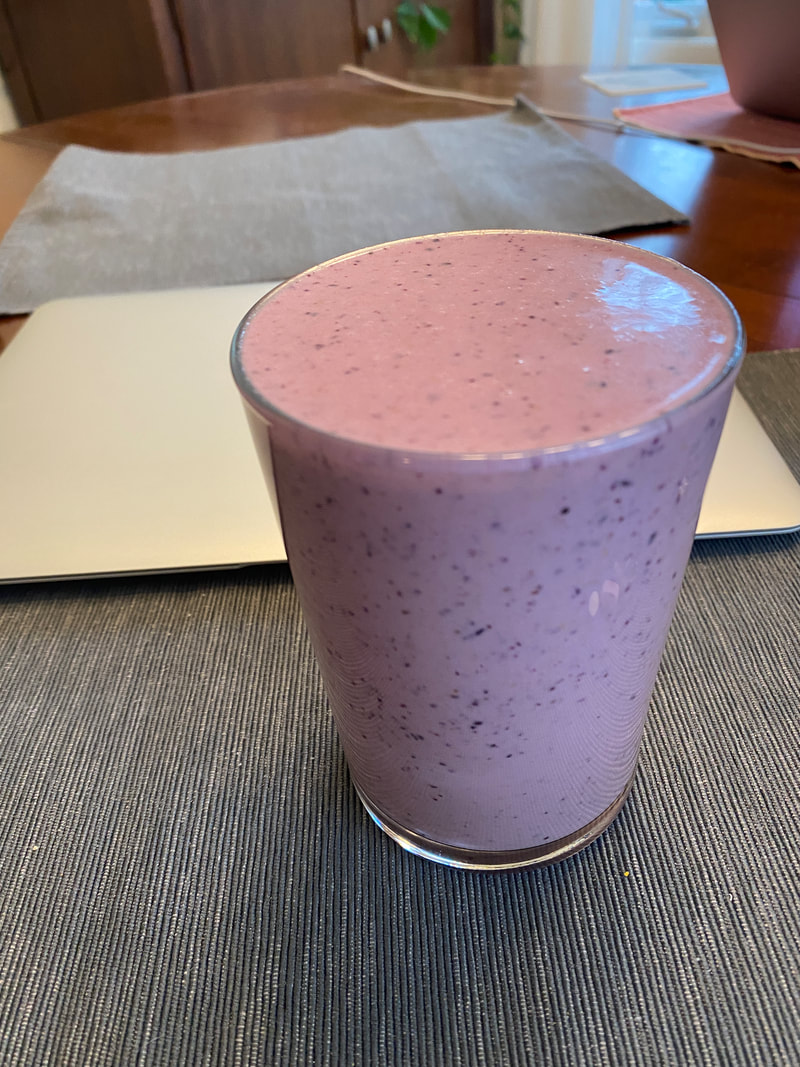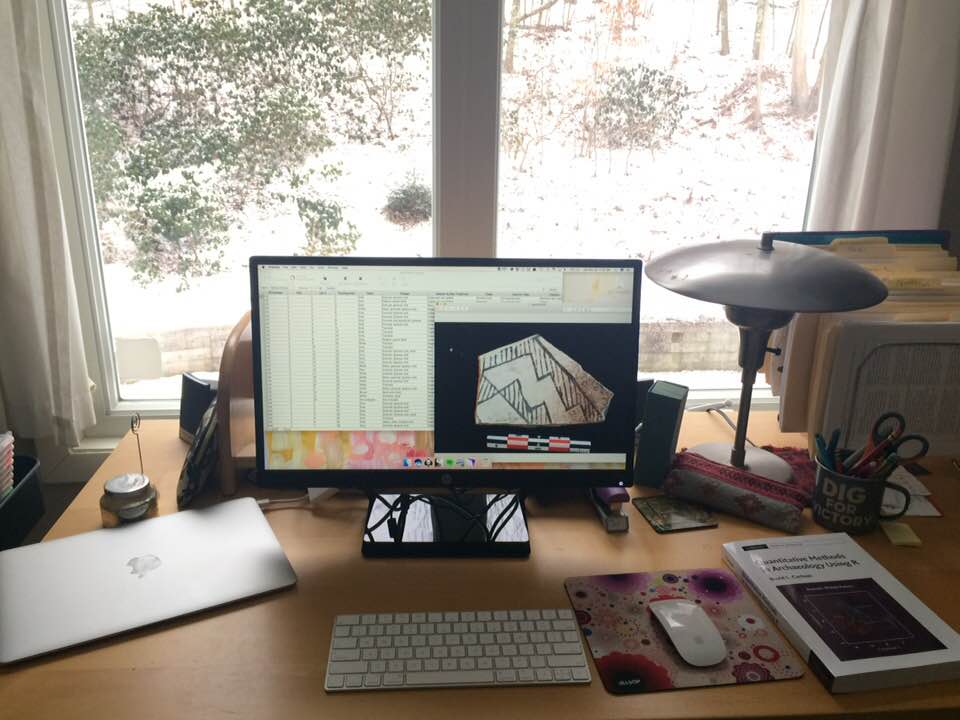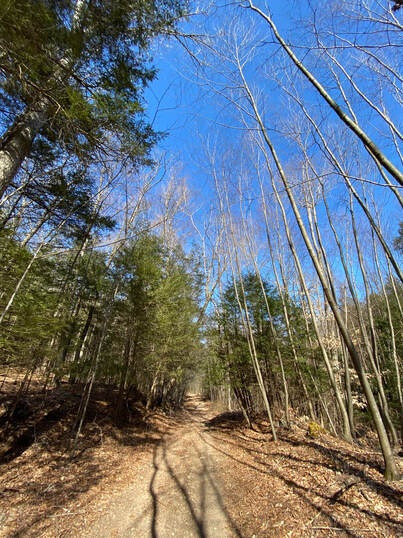|
I recently spent two years writing a dissertation from my rural home, with hardly any human contact, so I have some experience with what we’re now calling self-isolation and social distancing. Before that, I spent a decade as a practicing attorney, which despite what TV shows you, mostly meant sitting alone in an office and writing motions and briefs that were due on strict court deadlines, while billing my time in 6 minute increments. So I know a thing or two about being productive when your work means sitting in a chair with little social contact. With everyone working from home lately and struggling with being productive, I thought that some of my experiences might be helpful to someone. I think the first step is to accept that you’re not going to be productive right now. You’re just not. The same way my productivity crashed in November 2016 when a devastating election and horrifying news took over my life. The same way I had a hard time getting my motions written while my brother was fleeing from Hurricane Katrina. Our brains are focused on human survival right now, not on getting another document written. But eventually, awful as it sounds, those of us who stay healthy will start getting used to our new normal, and in this strange new world, work can be a respite. Establish a routine, get dressed every morning, get your butt in the chair. But then what? To be productive, you have to work on reducing your attention to the outside world. You’ve gotten the gist by now of what is going on in the world, and unless you’re a first responder, there’s nothing much you can do about it beyond staying home. But you’ll also be lonely, and things like social media and news and streaming TV are a lifeline right now and a connection to the old lives we’re all grieving for. Of course those connections attract us, and are a needed escape from what’s going on. But loneliness is part of hard work, at least if you are writing or creating art or doing anything else that requires deep attention. You can engage in some escapism, you should engage in some escapism! The trick is not to spend your whole day on the internet. You can’t be turning to the internet for a hit every time you feel lonely or sad—or every time the work gets hard. To some extent you just have to embrace the solitude. You can try to put your phone in the other room, close your email, tidy up your office, create time and space for attention. But personally, I never would have finished my dissertation without technology that actually turned the internet off and forced me to get back to work. I mainly used the Freedom app, and I’ve kept using it even after finishing my dissertation. I do recommend a paid subscription, which allows you to schedule your day and automatically turn off your distractions. I allow myself a few hours of free internet access 3x a day, but Freedom blocks my access from 9-12, 1-5 and then from 7 pm to 6 am. You can adjust the times and also choose which sites are or are not accessible. I only block social media, news sites, and a few other sources on Freedom, because those are the sites that send me down rabbit holes of distraction. Or you can block everything—which wasn’t usually an option for me since I needed to do library research online. Some days though, I’d find myself so distracted that I needed to shut my internet access off completely. For those times, I used a different app called Self Control to shut my access down completely. (Freedom can do this too of course, SelfControl is just a little easier for me to get at.) Often, just an hour of no WiFi will help me get back on track. Right now, my biggest distraction is coming from text messages, which was not previously the case, so I’m working on how to reduce that distraction. It may involve deleting Messages from my Mac and hiding my phone for part of the day. The Freedom app is also available on your phone, so that is another possibility. Meditation is super helpful in bringing your wandering mind back, but it does take practice and a daily commitment. But even if it’s just ten minutes when your mind is frazzled, it will help. Just don’t let meditation become another thing you beat yourself up over. I really liked the Calm app before it went to all pay, and it might be worth the cost right now. I have a great app on my phone called Breathe with some good, free guided meditations. There are also about a million guided meditations on YouTube. Music is great, of course. For me, it has to be quiet music that is so familiar that my brain doesn’t engage with it too much. There is one album I played so much that it now just automatically puts me into work mode when I start it (Mandolin Orange’s Tides of a Teardrop). Developing “get to work” rituals like this that help you get your head in the zone can be super helpful. Spotify has great study playlists and coffee house playlists, see what works for you. Or maybe you just need some white noise? Try this. Making tea and lighting a candle are also often part of my ritual. Exercise can also focus the mind, and your body desperately needs it when you’re working from home. I literally ended up in physical therapy from spending too much time sitting at my desk while writing. Do something, anything. I walk my dog, and getting out into the woods does wonders for my mood as well as my poor knees. I also do my PT stretches and some yoga stretches. And I love Yoga with Adriene on YouTube, especially when I'm in pain from too much sitting. I did also invest in this inexpensive exercise bike with a desk attached. OK you’re not going to be writing books on this thing, but you could easily do your allotted hour of morning Facebook or answer some emails! I also used an app called Stretchly that reminds you to take stretch breaks. But really, and most importantly, you have to accept that you cannot work 8 hours a day right now. As a lawyer, I quickly learned that if you managed to (honestly) bill 8 hours in a 10-hour or 12-hour workday, you were doing great. (Which may help explain why I didn’t want to keep practicing law!) But even now, working for a place that requires me to enter my time in 8 hour blocks rather than 6-minute segments, I am constantly feeling that I haven’t really done 8 hours of work in any given day. If your job is teaching and grading, or it’s mostly meetings and paperwork, or working with a team, then maybe working for 8 hours straight is easy most days. But if your job is mostly writing and thinking, it’s just a different kind of work. Writing often only happens in 1 or 2 or 4 hour stretches at most. On a good day, when you’re writing the easy section where you already have lots of ideas and the research is complete, you might be able to work productively for a whole afternoon or a whole day. But you won’t be able to keep that up for a week or a month. And it may take you four days of staring at a blank screen before you get going at all. Scheduling work time is the key. You can’t just wait for inspiration, you have to sit down to work even if it’s hard to get going. Some people like the pomodoro method (25 minutes of intense writing followed by a 5 minute break), some would rather work intensely for longer. Try to build other kinds of work in—maybe there’s a Zoom meeting in the morning and then you can work through the afternoon. Some people like to alternate reading days and writing days, to be inspired by awesome new research they’re reading about. Or you can plan to do some research in the morning and writing in the afternoon. Try to end your day knowing what the next few sentences are so you can jump right back in the next day. When I’m really stuck, sometimes it helps me to work on a different, easier project for a little while where the words just flow. (In fact, that’s basically why I am writing this piece right now.) Take notes on a book you’ve read, write a blog post, write some ideas for another part of your chapter. My online writing group on Slack was a life-saver for my dissertation, and if your coworkers are up for this or if you can find another good group of people whose schedules work with yours, they can push you and also support you. At the very least it’ll get your butt in the chair at a certain time of day. In my group, we would get together online at a set time a few days a week, chat for a few minutes then work “together” for a couple hours before taking a break to check in on how it went and chat about it. Or you could just do the check-ins. The goal is to create some accountability for what you are going to accomplish, and also someone to talk to about the challenges. In my opinion, you are also going to be most successful if you accept your natural circadian rhythms and work at the times of day when you are productive. When I first started my dissertation, I pushed myself to sit down to work at 9 am. And soon found that I was sitting there wasting time and being useless until about 4 pm, when suddenly I’d get to work and be productive till long into the night. Which meant I was spending 12 hours or more at the computer but only doing 4 or 5 hours of real work. Once I adjusted and focused my efforts on the 4 pm-midnight period, and allowed myself to rest during the daytime, I was so much more effective and happier. I know this isn’t possible for everyone, with strict work times or kids’ schedules. My husband was annoyed that I was on such a different sleep schedule than him. But it’s what worked for me, at least during the periods when I was really working intensively. Obviously, I am not saying “work when you feel like it”—you will never feel like it. Instead, I’m saying schedule your mandatory working time for when you are most likely to actually get work done. Whatever schedule you work on, try to make sure you’re really sleeping 7-8 hours a night. This is so important for keeping up your energy—and your immunity. And if you do end up working in the middle of the night, you have to give yourself permission to relax and recharge at other times of day, even if that’s when other people are working. I’m not a sleep expert, and I’ve never had serious trouble falling asleep, but one piece of advice I can offer is audiobooks. When I was staring at a screen all day reading and writing, picking up a novel before bed was not that appealing. But audiobooks allow you to rest your eyes and your mind. Short stories are good if a whole book is too much to bite off. (A lot of audiobook apps have a timer, so you don’t fall asleep and have it playing all night.) I also taught myself to knit, to give my hands something to do while I listened to books or watched TV, and I definitely recommend crafting of any kind as a way to recharge from the brain work! One big challenge right now that I didn't have in the past is that the house is full of food. I’ve always been careful not to keep too many snacks on hand so I couldn’t give in to cravings. But now that we have stocked up, there’s a lot more temptation. All I can offer on this is to try to have a schedule for healthy, filling meals, and maybe use the snacks as a reward that you can earn after a certain amount of work. And I guess I can offer you a great recipe!  This smoothie recipe has become my everyday breakfast, and one that I wake up excited for! Depending how much almond butter I put in, it will hold me for hours until lunch. Oh, also, did you know you can freeze peeled, sliced bananas?! I am definitely stocking up in case fresh bananas run short in the next couple weeks. Kefir is easily available in the dairy aisle even in my little town, and it’s not exactly something that people are hoarding, and it also keeps well since it’s fermented. Dissertation Brain Food Smoothie 1 cup low-fat unsweetened kefir (or plain yogurt, or whatever kind of milk you like) 1-2 tbsp almond butter or creamy peanut butter 1 small banana, cut into 1-2” slices (can be either fresh or frozen) 1/4 - 1/2 cup frozen blueberries Optional: 2 tbsp ground flax seed (you could also try hemp seed or chia seeds if you like them) Optional: 1/4 cup baby spinach or other greens Optional: 1/2 tsp honey (but I don't think you really need it) Add ingredients to blender and blend. If your blender is wimpy, it might help to add the liquids before the fruit.
1 Comment
|
AuthorI am an archaeologist who works on southwestern archaeology and specifically on Chaco Canyon outliers. Archives
April 2020
Categories |
Proudly powered by Weebly


 RSS Feed
RSS Feed